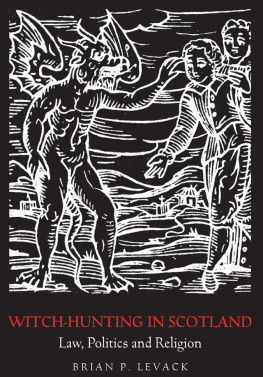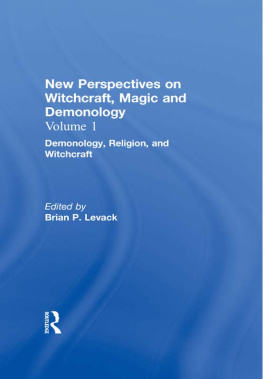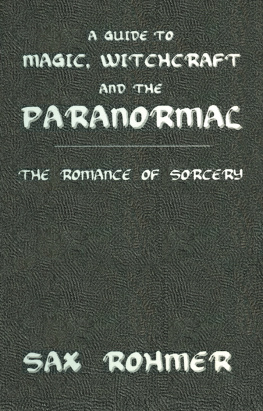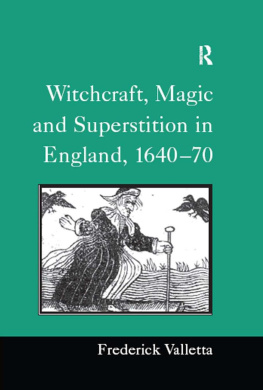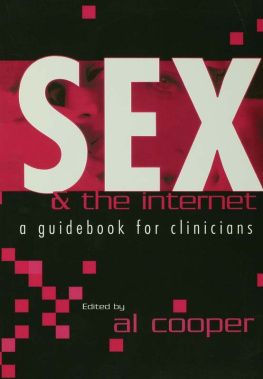JOB #: 142975
Author Name: Levack (V3)
Title of Book: Witchcraft, Magic, and Demonology
ISBN: 9780815336723
Publisher: Taylor and Francis
Trim Size: 6 9
Bulk in mm: 32
New Perspectives on Witchcraft,
Magic and Demonology
Volume 3
Witchcraft in the British Isles
and New England
Series Content
Volume 1
DEMONOLOGY, RELIGION, AND WITCHCRAFT
Volume 2
WITCHCRAFT IN CONTINENTAL EUROPE
Volume 3
WITCHCRAFT IN THE BRITISH ISLES
AND NEW ENGLAND
Volume 4
GENDER AND WITCHCRAFT
Volume 5
WITCHCRAFT, HEALING, AND POPULAR DISEASES
Volume 6
WITCHCRAFT IN THE MODERN WORLD
New Perspectives on Witchcraft,
Magic and Demonology
Volume 3
Witchcraft in the British Isles
and New England
Edited with introductions by
Brian P. Levack
University of Texas
ROUTLEDGE
New York/London
Published in 2001 by
Routledge
29 West 35th Street
New York, NY 10001
Published in Great Britain by
Routledge
11 New Fetter Lane
London EC4P 4EE
Routledge is an Imprint of Taylor & Francis Books, Inc.
Copyright 2001 by Routledge
Printed in the United States of America on acid-free paper.
All rights reserved. No part of this book may be reprinted or reproduced or utilized in any form or by
any electronic, mechanical, or other means, now known or hereafter invented, including any
photocopying and recording, or in any information storage or retrieval system, without permission in
writing from the publishers.
10 9 8 7 6 5 4 3 2 1
Library of Congress Cataloging-in-Publication Data
New perspectives on witchcraft / edited with introductions by Brian P. Levack.
p. cm.
Contents: v. 1. Demonology, religion, and witchcraft -- v. 2. Witchcraft in continental
Europe -- v. 3. Witchcraft in the British Isles and New England -- v. 4. Gender and
witchcraft -- v. 5. Witchcraft, disease, and popular healing -- v. 6. Witchcraft in the
modern world, 17502000.
ISBN 0-8153-3668-3 (set)
1. Witchcraft-History. I. Levack, Brian P.
BF1566 .N48 2002
133.4--dc21
2001048489
ISBN 0-8153-3668-3 (set)
ISBN 0-8153-3669-1 (v.1)
ISBN 0-8153-3671-3 (v.2)
ISBN 0-8153-3672-1 (v.3)
ISBN 0-8153-3673-X (v.4)
ISBN 0-8153-3674-8 (v.5)
ISBN 0-8153-3670-5 (v.6)
Contents
CR. Unsworth
Brian P. Levack
Jim. Sharpe
J. T. Swain
Annabel Gregory
Anne Reiber de Windt
Malcolm Gaskill
J. A. Sharpe
Deborah Willis
Gillian Bennett
Diane Purkiss
Malcolm Gaskill
Jim. Sharpe
Ian Bostridge
P. G. Maxwell-Stuart
S.W. MacDonald, A. Thom and A. Thom
Elwyn C. Lapoint,
Michael Clark
Bernard Rosenthal
Wendel Craker
Philip Gould
Louis J. Kern
Introduction
This volume brings together a selection of recent articles on accusations of witchcraft and on and prosecutions in the British Isles (England, Scotland, Wales, and Ireland) and colonial New England. The main reason for grouping these geographical areas together, aside from their isolation from the European continent, is that after 1603, when James VI of Scotland became James I of England, all of them owed allegiance to the same king. This dynastic unity did not give these countries a single government, but it did make them part of a loosely structured empire that possessed common religious, social, and cultural bonds. These countries were not exclusively English-speaking, but political elites in all of them, including English and Scottish settlers in Ireland, spoke English.
As an area of study in the history of witchcraft, the British Isles and New England possess only a fragile unity. There were considerable variations in the intensity of witchcraft prosecutions from one country to another. Scotland, a country with only one-quarter of the population of England, probably executed three times as many witches. The Scottish pattern of prosecutions had more similarities with some continental European countries, especially the German lands, than with England. Prosecutions were also more intense in New England than in England, especially in Massachusetts, but that intensity owes much of its strength to the large-scale witch-hunt that took place at Salem, Massachusetts, in 1692. There were relatively few prosecutions and even fewer executions in Wales and in Ireland.
Despite this broad variation in the number and the intensity of prosecutions, witchcraft trials in all these countries shared some similarities. The most significant was the absence of a fully developed image of the witch's sabbath-the alleged nocturnal gathering of witches-in the trial records. In England there was little mention of the pact with the Devil and no mention of the sabbath until 1612, and it was only during the witch trials instigated by the professional witch-finders Matthew Hopkins and John Stearne in the 1640s that such references appeared more than occasionally. Even then, the sabbaths described in these confessions were relatively tame affairs. In Scotland confessions to witches' gatherings occur as early as the 1590s, but the reported meetings did not include promiscuous sexual activity, the sacrifice of children, or the cannibalistic eating of dismembered children's bodies. Nor did witches allegedly fly to these assemblies. In New England a few references to the sabbath occurred in the trials, especially in 1692, but the details did not conform to the continental European stereotype.
The absence of graphic depictions of the sabbath in the British Isles and New England can be explained in part by the distinctive features of the criminal procedures used in their courts. Most continental European countries followed inquisitorial procedure under which professional judges controlled the entire judicial process and determined guilt or innocence by weighing pieces of evidence to determine if they satisfied prescribed standards of judicial proof. In England, Scotland, and Ireland, however, lay juries played an important role in determining guilt or innocence, and the entire system of criminal justice in these areas was characterized by an adversarial encounter between the defendant and his or her accusers. This system resulted in a number of acquittals, especially in England. Even more important, in none of these countries was torture a regular instrument of judicial interrogation. In England and Scotland torture could be used only if authorized by a special warrant from the Privy Council, as it was in the Scottish witch trials of 1591. In Scotland, however, it was used in an informal, illegal way at the time of the witches arrest, very often in connection with the pricking of the witches skin by long pins in order to discover the Devil's mark. This mark was a spot on the witch's body, allegedly given at the time of the negotiation of the demonic pact, that demonologists claimed was insensitive to pain and did not bleed. Torture administered in this way resulted in the production of a number of confessions that would not otherwise have been forthcoming. The use of this type of legal coercion provides the best explanation not only for the higher number of convictions in Scotland but for the admission by Scottish witches that they had attended the sabbath.


